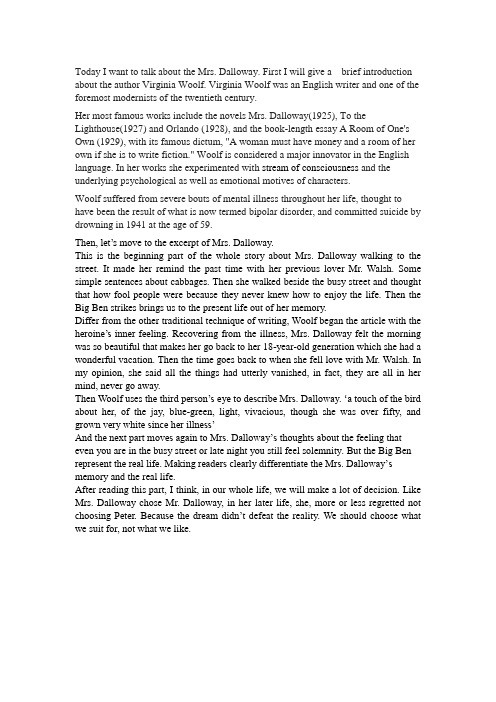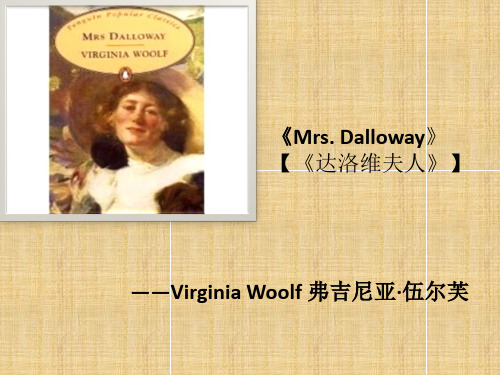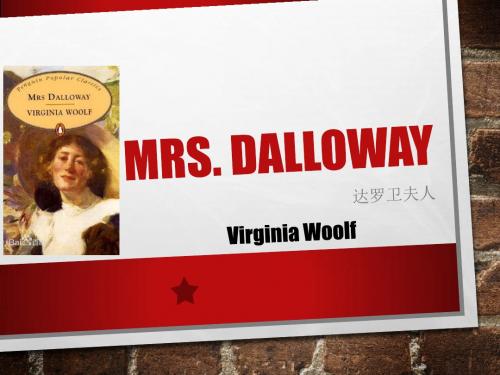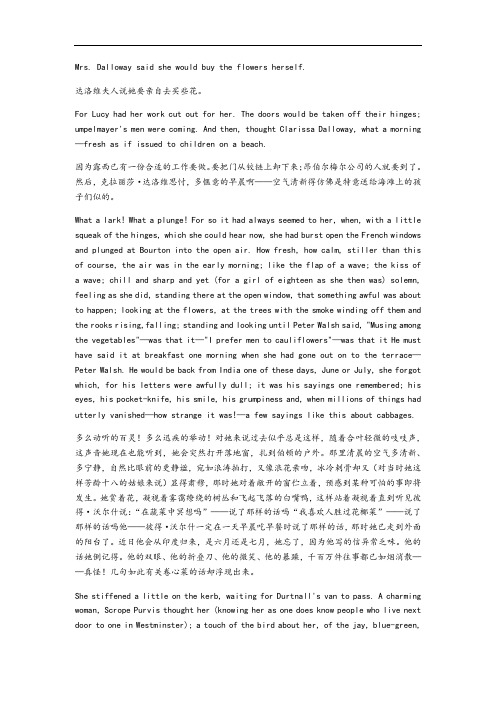Mrs Dalloway
【K12英语基础教育】mrsdalloway_39410

The critic, Ruotolo, excellently develops the idea behind the theme: "Estranged from the sanity of others, ‘rooted to the pavement,' the veteran [Septimus] asks ‘for what purpose' he is present. Virginia Woolf's novel honors and extends his question. He perceives a beauty in existence that his age has almost totally disregarded; his vision of new life... is a source of joy as well as madness.
Social commentary:
Woolf also strived to illustrate the vain artificiality of Clarissa's life and her involvement in it. Even though Clarissa is effected by Septimus' death and is bombarded by profound thoughts throughout the novel, she is also a woman for whom a party is her greatest offering to society. The thread of the Prime Minister throughout, the near fulfilling of Peter's prophecy concerning Clarissa's role, and the characters of the doctors, Hugh Whitbread, and Lady Bruton as compared to the tragically mishandled plight of Septimus, throw a critical light upon the social circle examined by Woolf.
达洛维夫人mrs dalloway

Plot Summary
Clarissa Dalloway goes around London in the morning, getting ready to host a party that evening. The nice day reminds her of her youth at Bourton and makes her wonder about her choice of husband; she married the reliable Richard Dalloway instead of the enigmatic and demanding Peter Walsh and she "had not the option" to be with Sally Seton. Peter reintroduces these conflicts by paying a visit that morning. Septimus Warren Smith, a veteran of World War I suffering from deferred traumatic stress, spends his day in the park with his Italianborn wife Lucrezia, where they are observed by Peter Walsh. Septimus is visited by frequent and indecipherable hallucinations, mostly concerning his dear friend Evans who died in the war. Later that day, after he is prescribed involuntary commitment to a psychiatric hospital, he commits suicide by jumping out of a window. Clarissa's party in the evening is a slow success. It is attended by most of the characters she has met in the book, including people from her past. She hears about Septimus' suicide at the party and gradually comes to admire the act of this stranger, which she considers an effort to preserve the purity of his happiness.
英国文学Mrs. Dalloway简析英文版

Today I want to talk about the Mrs. Dalloway. First I will give a brief introduction about the author Virginia Woolf. Virginia Woolf was an English writer and one of the foremost modernists of the twentieth century.Her most famous works include the novels Mrs. Dalloway(1925), To the Lighthouse(1927) and Orlando (1928), and the book-length essay A Room of One's Own (1929), with its famous dictum, "A woman must have money and a room of her own if she is to write fiction." Woolf is considered a major innovator in the English language. In her works she experimented with stream of consciousness and the underlying psychological as well as emotional motives of characters.Woolf suffered from severe bouts of mental illness throughout her life, thought to have been the result of what is now termed bipolar disorder, and committed suicide by drowning in 1941 at the age of 59.Then, let’s move to the excerpt of Mrs. Dalloway.This is the beginning part of the whole story about Mrs. Dalloway walking to the street. It made her remind the past time with her previous lover Mr. Walsh. Some simple sentences about cabbages. Then she walked beside the busy street and thought that how fool people were because they never knew how to enjoy the life. Then the Big Ben strikes brings us to the present life out of her memory.Differ from the other traditional technique of writing, Woolf began the article with the heroine’s inner feeling. Recovering from the illness, Mrs. Dalloway felt the morning was so beautiful that makes her go back to her 18-year-old generation which she had a wonderful vacation. Then the time goes back to when she fell love with Mr. Walsh. In my opinion, she said all the things had utterly vanished, in fact, they are all in her mind, never go away.Then Woolf uses the third person’s eye to describe Mrs. Dalloway. ‘a touch of the bird about her, of the jay, blue-green, light, vivacious, though she was over fifty, and grown very white since her illness’And the next part moves again to Mrs. Dalloway’s thoughts about the feeling that even you are in the busy street or late night you still feel solemnity. But the Big Ben represent the real life. Making readers clearly differentiate the Mrs. Dalloway’s memory and the real life.After reading this part, I think, in our whole life, we will make a lot of decision. Like Mrs. Dalloway chose Mr. Dalloway, in her later life, she, more or less regretted not choosing Peter. Because the dream didn’t defeat the reality. We should choose what we suit for, not what we like.。
Mrs Dalloway

情节摘要: 一个晴朗的夏日早晨,主人公克拉丽沙· 达洛维走 在伦敦的街道,为自己晚上的派对采买物品。美 好的天气使她想起了自己已逝的青春,以及她年 轻时的狂热追随者彼得.沃尔士。她思忖自己当初 嫁了可靠的达洛维,而不是捉摸不定的沃尔士, 是不是一个正确的决定。沃尔士当天从印度返回 伦敦来看望她,更让她突然思绪不宁。 同时,在伦敦的另一角是一战退伍军人塞普蒂默 斯· 史密斯和他的妻子露西娅。史密斯患有无名的 狂想症,经常幻见在一战中牺牲的好友伊凡。当 权威医师决定对他实行强制隔离治疗时,他跳楼 自尽。
因此,克拉丽沙虽然生活在矛盾之中, 却生活的并不痛苦,她找到了理想和现 实的平衡点并安然生活。我不知道该如 何定义这种能力,也许,这是一种属于 女性的智慧。达洛维夫人的生活到底是 幸福还是悲哀?我想都不至于,或许,这 就是千百年来属于女性的最合理的生活。 (书评原话)
关于作者: 1 人物简介 2 代表作品 3 作品影响
达洛维夫人是一战后英国社会对女性定义的典型 代表:“居家天使”。她接受社会强加的束缚, 甚至热切地扮演着自己的角色:政客的太太。 在书中,我们了解到,克拉丽沙在同彼得热恋的 时候,曾经不停的交谈,并且在交谈中感觉到精 神上的默契因此感到了理解的美妙,语言的美妙, 交流的美妙。当克拉丽沙老了的时候,看到年轻 人只会用低级的娱乐来刺激感观而无法用语言进 行精神的交流的时候,她说她为此感到遗憾,并 且幸福的回忆起年轻时和彼得长谈的情形。因此 我们也可以知道,克拉丽沙,是一个有着自己独 立的精神的,会思考的的女人。一个可以自己决 定自己生活的女人。
代表作品:
出航(The Voyage Out,1915年) 夜与日(Night and Day,1919年) 墙上的斑点(Mark on the wall,1919) 雅各的房间(Jacob's Room,1920年) 达洛维夫人(Mrs. Dalloway,1925年) 到灯塔去(To the Lighthouse,1927年) 奥兰多(Orlando: a Biography,1928年) 海浪(The Waves,1931年) 岁月(The Years,1937年) 幕间(Between the Acts,1941年)
Mrs. Dalloway

BACKGROUND
Characteristics of Modernism
(Time:1910-1945)
• Modern literature often features a marked pessimism, a clear
rejection of the optimism apparent in Victorian literature.
THEMES
The novel has two main narrative lines involving two separate characters (Clarissa Dalloway and Septimus Smith); within each narrative there is a particular time and place in the past that the main characters keep returning to in their minds. For Clarissa, the "continuous present" (Gertrude stein's phrase) of her charmed youth at Bourton keeps intruding into her thoughts on this day in London. For Septimus, the "continuous present" of his time as a soldier during the great war keeps intruding, especially in the form of Evans, his comrade.
Big Ben
mrsdalloway达洛维夫人

Mrs. Dalloway said she would buy the flowers herself.达洛维夫人说她要亲自去买些花。
For Lucy had her work cut out for her. The doors would be taken off their hinges; umpelmayer's men were coming. And then, thought Clarissa Dalloway, what a morning —fresh as if issued to children on a beach.因为露西已有一份合适的工作要做。
要把门从铰链上卸下来;昂伯尔梅尔公司的人就要到了。
然后,克拉丽莎·达洛维思忖,多惬意的早晨啊——空气清新得仿佛是特意送给海滩上的孩子们似的。
What a lark! What a plunge! For so it had always seemed to her, when, with a little squeak of the hinges, which she could hear now, she had burst open the French windows and plunged at Bourton into the open air. How fresh, how calm, stiller than this of course, the air was in the early morning; like the flap of a wave; the kiss of a wave; chill and sharp and yet (for a girl of eighteen as she then was) solemn, feeling as she did, standing there at the open window, that something awful was about to happen; looking at the flowers, at the trees with the smoke winding off them and the rooks rising,falling; standing and looking until Peter Walsh said, "Musing among the vegetables"—was that it—"I prefer men to cauliflowers"—was that it He must have said it at breakfast one morning when she had gone out on to the terrace—Peter Walsh. He would be back from India one of these days, June or July, she forgot which, for his letters were awfully dull; it was his sayings one remembered; his eyes, his pocket-knife, his smile, his grumpiness and, when millions of things had utterly vanished—how strange it was!—a few sayings like this about cabbages.多么动听的百灵!多么迅疾的举动!对她来说过去似乎总是这样,随着合叶轻微的吱吱声,这声音她现在也能听到,她会突然打开落地窗,扎到伯顿的户外。
MrsDalloway达洛维夫人
Mrs. Dalloway said she would buy the flowers herself.达洛维夫人说她要亲自去买些花。
For Lucy had her work cut out for her. The doors would be taken off their hinges; umpelmayer's men were coming. And then, thought Clarissa Dalloway, what a morning—fresh as if issued to children on a beach.因为露西已有一份合适的工作要做。
要把门从铰链上卸下来;昂伯尔梅尔公司的人就要到了。
然后,克拉丽莎·达洛维思忖,多惬意的早晨啊——空气清新得仿佛是特意送给海滩上的孩子们似的。
What a lark! What a plunge! For so it had always seemed to her, when, with a little squeak of the hinges, which she could hear now, she had burst open the French windows and plunged at Bourton into the open air. How fresh, how calm, stiller than this of course, the air was in the early morning; like the flap of a wave; the kiss of a wave; chill and sharp and yet (for a girl of eighteen as she then was) solemn, feeling as she did, standing there at the open window, that something awful was about to happen; looking at the flowers, at the trees with the smoke winding off them and the rooks rising,falling; standing and looking until Peter Walsh said, "Musing among the vegetables?"—was that it?—"I prefer men to cauliflowers"—was that it? He must have said it at breakfast one morning when she had gone out on to the terrace—Peter Walsh. He would be back from India one of these days, June or July, she forgot which, for his letters were awfully dull; it washis sayings one remembered; his eyes, his pocket-knife, his smile, his grumpiness and, when millions of things had utterly vanished—how strange it was!—a few sayings like this about cabbages.多么动听的百灵!多么迅疾的举动!对她来说过去似乎总是这样,随着合叶轻微的吱吱声,这声音她现在也能听到,她会突然打开落地窗,扎到伯顿的户外。
Mrs. Dalloway
Peter Walsh - A close friend of
Clarissa’ Clarissa’s, once desperately in love with her. Clarissa rejected Peter's marriage proposal when she was eighteen, and he moved to India. He has not been to London for five years. He is highly critical of others, is conflicted about nearly everything in his life, and has a habit of playing with his pocketknife. Often overcome with emotion, he cries easily. He frequently has romantic problems with women and is currently in love with Daisy, a married woman in India. He wears horn-rimmed glasses and horna bow tie and used to be a Socialist.
Relationship of the major figures
Septimus Warren Smith
Clarissa Dalloway
Elizabeth Dalloway
William Bradshaw
Peter Walsh
Richard Dalloway
Plot
Mrs. Dalloway covers one day from morning to night in one woman’s life. woman’ Clarissa Dalloway, an upper-class upperhousewife, walks through her London neighborhood to prepare for the party she will host that evening
达洛维夫人mrs-dalloway
Woolf goes beyond criticizing the treatment of mental illness. Using the characters of Clarissa and Rezia, she makes the argument that people can only interpret Septimus' shell-shock according to their cultural norms. Throughout the course of the novel Clarissa does not meet ptimus. Clarissa's reality is vastly different from that of Septimus; his presence in London is unknown to Clarissa until his death becomes idle chat at her party. By never having these characters meet, Woolf is suggesting that mental illness can be contained to the individuals who suffer from it without others who remain unaffected ever having to witness it.
Mrs Dalloway 达洛维夫人
Mrs. Dalloway said she would buy the flowers herself.达洛维夫人说她要亲自去买些花。
For Lucy had her work cut out for her. The doors would be taken off their hinges; umpelmayer's men were coming. And then, thought Clarissa Dalloway, what a morning—fresh as if issued to children on a beach.因为露西已有一份合适的工作要做。
要把门从铰链上卸下来;昂伯尔梅尔公司的人就要到了。
然后,克拉丽莎·达洛维思忖,多惬意的早晨啊——空气清新得仿佛是特意送给海滩上的孩子们似的。
What a lark! What a plunge! For so it had always seemed to her, when, with a little squeak of the hinges, which she could hear now, she had burst open the French windows and plunged at Bourton into the open air. How fresh, how calm, stiller than this of course, the air was in the early morning; like the flap of a wave; the kiss of a wave; chill and sharp and yet (for a girl of eighteen as she then was) solemn, feeling as she did, standing there at the open window, that something awful was about to happen; looking at the flowers, at the trees with the smoke winding off them and the rooks rising,falling; standing and looking until Peter Walsh said, "Musing among the vegetables?"—was that it?—"I prefer men to cauliflowers"—was that it? He must have said it at breakfast one morning when she had gone out on to the terrace—Peter Walsh. He would be back from India one of these days, June or July, she forgot which, for his letters were awfully dull; it was his sayings one remembered; his eyes, his pocket-knife, his smile, his grumpiness and, when millions of things had utterly vanished—how strange it was!—a few sayings like this about cabbages.多么动听的百灵!多么迅疾的举动!对她来说过去似乎总是这样,随着合叶轻微的吱吱声,这声音她现在也能听到,她会突然打开落地窗,扎到伯顿的户外。
- 1、下载文档前请自行甄别文档内容的完整性,平台不提供额外的编辑、内容补充、找答案等附加服务。
- 2、"仅部分预览"的文档,不可在线预览部分如存在完整性等问题,可反馈申请退款(可完整预览的文档不适用该条件!)。
- 3、如文档侵犯您的权益,请联系客服反馈,我们会尽快为您处理(人工客服工作时间:9:00-18:30)。
Style 2
• 3. two time schemes: physical and actual time vs. subjective and mind time. Linear time vs. circular time. Past and present mingled (the novel takes the reader through only one day in Clarissa and Septimus’ lives, and yet reveals much about their characters and about humanity in general) • 4. feminine sensitivity and consciousness reflected in Clarissa
Major Works
• Woolf's early novels—The Voyage Out (1915), Night and Day (1919), and Jacob's Room (1922) • To the Lighthouse (1927) • Mrs. Dalloway (1925) • Orlando (1928) • The Waves (1931) • A Room of One’s Own (1929) • Three Guineas (1938). • The Common Reader (1925) and The Common Reader: Second Series (1932). • The Diary of Virginia Woolf.
Style 3
• 5. symbolism and imagery: rippling waves, sea, (plunge: the feeling of jumping into a pool of water; opening the windows of life and plunging into it); time (Ben Clarissa as well as Septimus sending ripples outward, affecting others around) • 6. theme: life and death, sanity and insanity, human connection and separation • 7. loose syntax, plot and narrative voice
Mrs. Dalloway
By Virginia Woolf
Life
• Born Adeline Virginia Stephen in London on January 25, 1882, one of four children, daughter of biographer and critic Leslie Stephen (later Sir Leslie) and Julia Jackson Duckworth. educated at home by her father. voracious reader of books in father’s library. • married Leonard Woolf, a critic and writer on economics and politics. Virginia Woolf, her husband, her siblings, and their friends became known as the Bloomsbury Group. • In 1917 the Woolfs founded Hogarth Press
Life tragedy
• Her mother’s death in 1895 trigger the first mental breakdown. When father died in 1904, suffered a second breakdown and attempted suicide by jumping out of window. On Match 28, 1941, she left notes for her husband Leonard Woolf and sister Vanessa before drowning in the River Ouse. Stream of consciousness (interior monologue, soliloquy) • Time schemes • Symbolism and imagery: thin thread of human connection, mesh, net for human relationship (p82) • Loose syntax • Multiple narrative voices • Coherent device • Irony
Style 1
• 1. portrayal of subjective world: Though not in the first person, reader immersed in the subjective mental world of various characters, their motivations and prejudices. Mental arguments • 2. flow of consciousness, floating from the mind of one character to the next (eg in part 2, Maisie Johnson, a girl from Edinburgh asking the couple directions to Mrs. Carrie Dempster, an older woman who notices Maisie and is reminded of her youth to Mr. Bentley, a man awed by the privileged invited into St. Paul’s Cathedral.)
